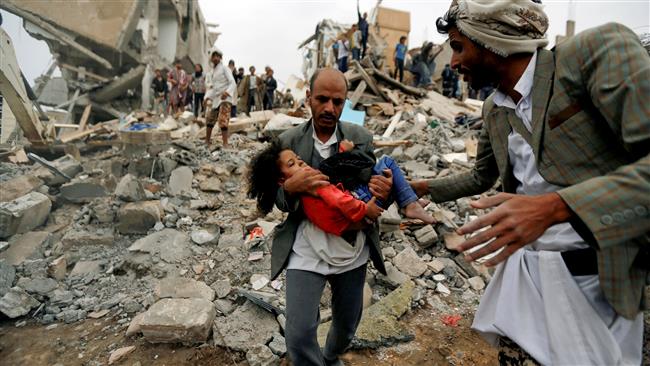
RNA - According to a Friday report by HRW, the current and former members of the coalition have refused to reply to the rights group’s correspondence in 2017, which urged them to release the results of their investigations into the unlawful airstrikes in Yemen, despite the fact that they are legally bound to do so under the international law.
“No coalition member can claim clean hands in Yemen until all its members explain their role in scores of documented unlawful attacks,” said HRW Middle East Director Sarah Leah Whitson.
“It borders on the absurd for the coalition to claim its own investigations are credible when it refuses to release even basic information like which countries participated in an attack and whether anyone has been held accountable,” she added.
The report provided detailed witness account of several unlawful airstrikes by the coalition which killed and wounded a massive number of civilians.
According to the HRW report, the coalition has repeatedly claimed that it refers the reported cases of violations to its investigative body, the Joint Incidents Assessment Team (JIAT), which has mainly “absolved the coalition of wrongdoing” so far.
“Yemeni civilians who are paying the price of this war deserve far more than blanket denials or generic expressions of sympathy,” Whitson said.
“UN member countries should make crystal clear to coalition members that they are failing to meet even basic standards for transparency, and that – as none of the warring parties seem willing to do so – the Human Rights Council will step in and make sure these violations are investigated,” she added.
The coalition currently consists of Saudi Arabia, Bahrain, Kuwait, the United Arab Emirates, Egypt, Jordan, Morocco, and Sudan. Qatar withdrew from the coalition in June amid a diplomatic rift with Riyadh, Manama, Cairo and Abu Dhabi.
The coalition has been pounding Yemen since March 2015 in an attempt to crush the popular Houthi Ansarullah movement and reinstate the former president, Abd Rabbuh Mansur Hadi, who is a staunch ally of the Riyadh regime.
More than 12,000 people have been killed since the onset of the campaign more than two and a half years ago. Much of the Arabian Peninsula country’s infrastructure, including hospitals, schools and factories, has been reduced to rubble due the war.
The Saudi war has also triggered a deadly cholera epidemic across Yemen.
According to data provided by the World Health Organization and Yemen’s Health Ministry, the country’s cholera outbreak, the worst on record in terms of its rapid spread, has infected 612,703 people and killed 2,048 since it began in April, with some districts still reporting sharp rises in new cases.
The United Nations says the Saudi war has left some 17 million Yemenis hungry, nearly seven million facing famine, and about 16 million almost without access to water or sanitation.
847/940